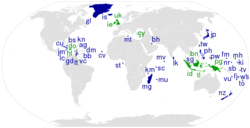| Revision as of 16:42, 7 February 2008 editSchmuckyTheCat (talk | contribs)Extended confirmed users, Pending changes reviewers, Rollbackers23,934 editsm Reverted to revision 189526910 by Sony-youth; repeat of first sentence in para, and also edit by banned user. (TW)← Previous edit | Revision as of 21:51, 7 February 2008 edit undo203.218.46.143 (talk)No edit summaryNext edit → | ||
| Line 6: | Line 6: | ||
| The other group comprises smaller island countries such as ], the ], the ], ], and the ]. These countries tend to be very different from continental countries. Their small size usually means there is little agricultural land and rarely many ]s. However, in modern times, smaller island countries around the world have become centres for ], which in many is the dominant industry. | The other group comprises smaller island countries such as ], the ], the ], ], and the ]. These countries tend to be very different from continental countries. Their small size usually means there is little agricultural land and rarely many ]s. However, in modern times, smaller island countries around the world have become centres for ], which in many is the dominant industry. | ||
| Some island countries are centered on one or two major islands, such as the ] or ]. Others are spread out over hundreds or thousands of smaller islands, such as the ], ] or the ]. Some island countries share their islands with other countries; these include the United Kingdom and the ], ] and ], and ] and ] |
Some island countries are centered on one or two major islands, such as the ] or ]. Others are spread out over hundreds or thousands of smaller islands, such as the ], ] or the ]. Some island countries share their islands with other countries; these include the United Kingdom and the ], ] and ], and ] and ]; whereas countries such as the ] and ] have no land border at all. | ||
| ==See also== | ==See also== | ||
Revision as of 21:51, 7 February 2008

An island country is a country that is wholly confined to an island, several islands, an island group or several island groups, and has no territory on the mainland of a continent. Forty-seven of the world's countries are island countries (2008), including most of the smallest ones.
Island countries can be divided in two approximate groups. A group of large, relatively populous nations which are usually close to a continent including Japan, Sri Lanka, the Philippines, Cuba, the United Kingdom, Madagascar, and Indonesia. These countries typically share cultural and political similarities with their continental neighbours. Island locations have frequently been advantageous, providing isolation from invasion and the maritime abilities of the population gave advantage in regional and international trade.
The other group comprises smaller island countries such as Malta, the Comoros, the Bahamas, Tonga, and the Maldives. These countries tend to be very different from continental countries. Their small size usually means there is little agricultural land and rarely many natural resources. However, in modern times, smaller island countries around the world have become centres for tourism, which in many is the dominant industry.
Some island countries are centered on one or two major islands, such as the United Kingdom or Japan. Others are spread out over hundreds or thousands of smaller islands, such as the Philippines, Indonesia or the Maldives. Some island countries share their islands with other countries; these include the United Kingdom and the Republic of Ireland, Haiti and Dominican Republic, and Saint Martin and Papua New Guinea; whereas countries such as the Philippines and Madagascar have no land border at all.
See also
- List of island countries
- List of islands (by country)
- List of countries
- List of island countries by population density
- Small Island Developing States